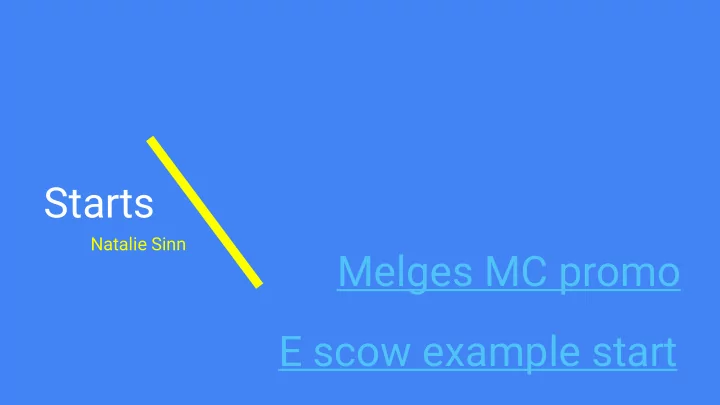

Starts Natalie Sinn Melges MC promo E scow example start
- Check weather - Check Yourself: Warm-up, 1+ hours before Countdown watch, polarized sunglasses, hat/visor, the start sunscreen, layers, water bottle, snack, VHF radio On dry land, what can I do? - Check-in with your crew - Check your boat - Get out there early to check wind/course
5-60m before start - Where to start? favored - Wind oscillates 95% side of line and time How to prep for a great race? course= balance between the best - Gather wind readings- breeze, lifted tack, clear sail upwind on each tack lane and get high and low angles and wind pattern - Wind direction indicators - Check your speed- two boat tuning; compare - Flags, anchored speed and angle to fleet boats, other sailboats - Evaluate Starting Line- time distance from boat - Talk with crew / to pin, check starting competitors laylines (then check again), get line sight - Geography - Remember Final - Bays, low spots, Time and Final hills, points, Distance shorelines
0 MPH - 100% full speed. Stay very close to line. 0-5m...when do 5 MPH - Crawl at line at 1m. Sprint at 45 seconds. I crawl? 10 MPH - Crawl at line at 1m. Sprint at 10 seconds. ***rough numbers. Other 15 MPH - Crawl at line at 1m. variables will influence. Sprint at 8 seconds.
Where do I crawl? - Wind from right - Stop far from line - Don’t stop by RC - Point into wind - Wind from middle - Point into wind - Wind from left - Stop close to line - Don’t stop by buoy - Point into wind
- First, remove vang tension - For slowing down How to crawl? - Maybe backwind - Ease mainsheet, tiller movement, boards - Once crawling - Trim mainsheet - Maintain your personal bubble - AND stay closer to windward boat than leeward boat (you need a hole to accellerate!) - Obey rules - Windward / leeward - Room & opportunity
Bodyweight - Steer with weight Steering - Move weight to highside to head down - Move weight to lowside to head up - Minimal tiller movement - This is important when crawling and racing
- Look under boom @ buoy and 0-1m...Sprint flag to find distance from line - Sprint at final time - Sprint at final distance - Turn down - Goal is to be closehauled at full speed, crossing the line at start - not reaching - not pinching
- Balance (reduce helm) After the start - Feel the tiller - Feel the speed of boat - Do you feel fast? - Steer with bodyweight - Adjust settings - Lock in, look out - Maintain personal bubble - Avoid wind shadows
What to do as - Where are the boats? - Traffic and fleet (are we crossing? Find me a lane, help call rules/room, can I crew? tack? W hen boat below tacks…) Minimize finger pointing - - Anticipate - Time pre-start activities, call the distance to line, time to start - Hike like pencil, help with sail controls pre and post start - Call the puffs and shifts - Look for ripples, fast sailboats relative to others, and wind direction indicators Concisely inform -
Subscribe to Speed & Smarts?
“For who can ask more of a man Than giving all within his span Giving all, it seems to me Is not so far from victory” - George Joseph Moriarty
Recommend
More recommend